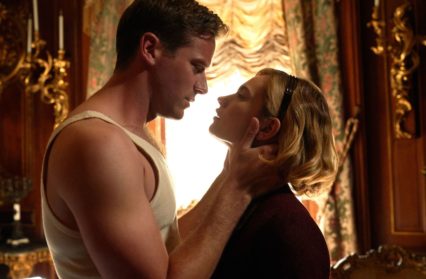Matt Taylor reviews Rebecca, Ben Wheatley’s new adaptation of the 1938 romantic thriller novel.
What do you call a ghost story without any ghosts? Rebecca, of course.
Daphne du Maurier’s 1938 novel was immortalised on the silver screen by Alfred Hitchcock in 1940. Now, 80 years later, it has been given a new lease of life by cult British director Ben Wheatley, who imbues the story with his signature flair for an oppressive atmosphere and morally murky characters. It certainly won’t please everyone, let alone Hitchcock purists, but for those who’ve grown fond of Wheatley’s style over the years, there’s plenty to enjoy here.
Wheatley’s take on the story sticks very closely to du Maurier’s source material: we meet a young woman (Lily James) working in Monte Carlo, who’s swept off her feet by the mysterious Maxim de Winter (Armie Hammer). After a whirlwind wedding and honeymoon around Europe, the new Mrs de Winter is brought back to Manderley Hall, where she meets intense housekeeper Mrs Danvers (Kristin Scott Thomas), and slowly begins to realise that she is living in the shadow of Maxim’s deceased first wife.
One thing Ben Wheatley has always excelled at is his use of atmosphere. It’s what allowed Kill List to pull off moving from a mob flick to a horror movie, and Sightseers to evolve from a buddy road-trip movie to a pitch-black comedy. Here, his skills are even more honed; Rebecca traverses genres with ease, from sunny European romance in its opening act to the jaw-dropping psychological thriller of its finale, by shades of del Toro-esque haunted house horror in its middle section. The tone never feels muddled, either: each section of the film reflects Mrs de Winter’s own state of mind – her initial innocence and naivety are replaced by intimidation and fear, which in turn are then pushed out in favour of a growing confidence that threatens to corrupt her.
The film’s various locales also help ease the tone changes; the bright sun and gorgeous beaches of Monte Carlo are distorted into unease once we reach Manderley – itself a thing of perverse beauty. It’s a grand stately manor that is extremely difficult to feel at home in. Wheatley creates an atmosphere so oppressive and hostile in the house that it feels as though the building itself actively hates Mrs de Winter, protesting the very idea of a woman other than Rebecca herself running the place. Everything about Manderley feels stifling and uncomfortable, and we share Mrs de Winter’s inability to settle in it. Is the building actually haunted by the ghost of Rebecca, or is it simply Mrs de Winter’s feeling terrorised by the memory of her? The film itself holds no clear answers, but its ideas are certainly up for debate.
That debate is one thing that gives it strength over Hitchcock’s adaptation – there’s a moral ambiguity present here that isn’t in the original version. As the narrative moves towards its conclusion, we begin to realise that none of our main characters are particularly ‘good’ people: they lie and manipulate as though it’s second nature to them. Even sweet, innocent Mrs de Winter is corrupted as the film goes on – she has a distinct need to feel wanted by Maxim, and the lengths she goes to in order to secure that are quite something. She’s given a lot more agency here than in Hitchcock’s version, and James plays her superbly, so that even though we may not like her by the ending, we at least respect and engage with her.
The same could very easily be said about Hammer and Thomas – neither Maxim nor Danvers are likeable people, but they’re played so well that we can’t help but revel in their presence. They’re helped along by an excellent script from Jane Goldman, whose dialogue positively sparkles with life, allowing Thomas in particular to showcase some of her best work in years. Danvers is engaging and eerily unsettling all at once, and her various confrontations with James are really something to behold – in true Wheatley style, we’re never quite sure which of them we dislike more.
This new Rebecca is unmistakably a Ben Wheatley film. It starts out slow, and gradually dials up the tension until we can’t bear it anymore. It’s a magnificent piece of work from the auteur that even outshines Hitchcock’s original in places – with its luxurious costumes, sumptuous set design, excellent score, beautiful cinematography, excellent performances, electric dialogue, and steady direction, Wheatley’s take on the classic novel is exactly the jumpstart our locked-down lives need so sorely right now.
Rebecca is available to stream now on Netflix.
Matt Taylor is a regular contributor to Wales Arts Review.












